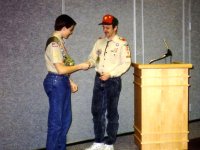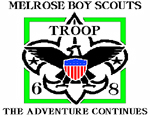The Scoutmaster Conference
stevejb68 on September 9, 2006 in Advancement, Leadership, scoutmaster conference The Scoutmaster Conference. There seems to be a lot of conversation, in some circles, about what this should actual be about, and what it should include. The BSA books seem to be a little vague about it and only give a few general thoughts on the subject. Some new Scout leaders seem to be confused when it comes time to have a conference with a boy.
The Scoutmaster Conference. There seems to be a lot of conversation, in some circles, about what this should actual be about, and what it should include. The BSA books seem to be a little vague about it and only give a few general thoughts on the subject. Some new Scout leaders seem to be confused when it comes time to have a conference with a boy.
I have been doing them for 25 years. I would like to share what I do during a conference. As you read this you may agree with some things, and you may disagree with others. The way I do it works for me, and it has worked for the Scouts who have done a conference with me. It helps them to think about some things, and helps to prepare them for their board of reviews. My assistant scoutmaster usually does the Tenderfoot through First Class Scouts, while I take care of the Star, Life, and Eagle candidates.
Okay, before I begin, here is a couple points I want you to keep in mind. A Scoutmaster Conference can be held at any time a Boy Scout needs one, not only when he is finishing a rank. The points I list here are my points for the conference requirement for the ranks. Another requirement for any rank is “Show Scout Spirit”. I take time during the scoutmaster conference to cover this requirement also.
When I do a conference with a Boy Scout it usually goes for more then the 15 “recommended” minutes. I try to get the Scout to discuss ten points (which I am about to discuss). And sometimes, actually many times, he will have something to say. It is our job as scoutmasters to encourage that dialog and try to keep our mouths shut while he is talking. Listen to him, and then guide him. It is not uncommon for a conference to last an hour or more when I am with a Scout for his Eagle Rank scoutmaster conference. The boys are okay with this, they know what to expect. (So don’t write me about holding such a long conference.)
That being said, here we go…
A) The first two points of my conference are actually five things. The Scout should know the Scout Oath, Law, Motto, Slogan, and Outdoor Code. He should be able to recite them. He need to know what they mean, and be able to explain to me what they mean. I will ask him what two parts of the Scout Law he finds difficult to follow, and which ones he finds the easiest to do. What did he do for a good turn that day? What should he “Be Prepared” for?
B) We will look at his attendance at meetings and his participation on troop outings. Our troop recommends that a Scout attends two thirds of troop meetings and at least half of the outings. If he has a great attendance record I compliment him on doing well. If he is lacking, then we discuss why he has not been attending, and what he will do about it. Each rank has a participation requirement after all.
C) A Scout is thrifty. Are his dues paid up to date? Has he participated in troop fundraisers? Does he do his duty to the troop by doing his best when the troop has a fundraiser, or does he sit back and let the other guys do the work? Raising money for the troop is the whole troop’s responsibility, not the job of just a few.
D) Attitude, and setting a good example, is another point that we cover. Does he like being in Scouts? If not, then why is he a member? Does he set a good example for other boys in the troop? Or is he a Scout who needs to work on that area? Older Scouts can set good examples for younger Scouts, but younger Scouts can also do the same for the older boys.
E) Is his uniform up to date? I often have the uniform checklist and conduct a quick inspection. I ask him to correct the incorrect things on his uniform before he attends his board of review. Our troop does not expect a boy to be full uniform from head to toe. However, we do expect him to pass the inspection with a score of 75 (out of a 100) or higher.
F) Service to others is an important part of the Boy Scout program. Has he participated in troop service and community projects? What has he done outside of Scouting to help the community? Did he just do his hours of service as required by the rank, or did he continue serving in other ways?
G) We will check his advancement progress. How long has it been since he finished his last ranked? If it has been quite awhile, we will discuss the reasons for it. Has he taken advantage of advancement opportunities when he has had the chance? We also review the requirements for his next rank and check how far along he is along that trail.
H) Leadership is a very important requirement of the last three Boy Scout ranks. We will look back and see how his leadership has been. I ask him how he thinks he has done. How can he improve? What did he do in his last troop office? Does he think he completed the tasks of that office? Did he do them well? What other leadership responsibilities does he have in the troop?
I) The final point is setting goals. When does he plan to attain his next rank? What smaller goals are needed to meet the larger goal. Were his previous goals met on time? If not, then why weren’t they? Does he have any goals outside of Scouting? Can Scouting help him achieve those goals?
Of course, like many conversations, we get sidetracked a lot during a scoutmaster conference. I don’t see a problem with that. It gives the Scout and Scoutmaster a chance to get to know each other a little better. Maybe share some points of interest. After a few minutes I try to guide the conversation back to the things we need to discuss.
Well, that pretty much sums it up. I hope this gives you some ideas as you conduct your own Scoutmaster Conferences.


Hey Scoutmaster Steve,
Lots of great stuff here. In item H though you mention leadership as an important requirement for the last 3 ranks. But except for the leadership involved in the Eagle project, I can’t find a leadership requirement for any rank.
Can you clarify?
The leadership covers his position of responsiblity, as well as general leadership within the troop. Did he have responsibilities at meetings, or outings? Does he set a good example within the troop. Is he willing to take on duties, or help others with their duties?
All wonderful attributes and qualities to have and continuously work towards improving. But they are not requirements for any rank, are they? Some of the PORs don’t really have much of a leadership opportunity. Bugler counts just as much as SPL does.
Hey Scoutmaster Steve,
Very helpful stuff. I’ve recently moved into Scoutmaster and I have an Eagle conference in a couple of days. I just didn’t know what to even talk about. It’s been at least 25 years since my own Eagle conference and I could not remember a thing. I’ve bookmarked your site for future inspiration!
Like Matt, I've recently moved into Scoutmaster and I have an Eagle conference right away. I appreciate your voice of experience and I am going to adapt your points to my own style. Thank you!
PS: I, too, am a big fan of 'small talk' as you shepherd the guys thru the scouting and responsibility questions. It is in all that 'small talk' that you find out who the kid really is, and where he'd like to head in life. Important information for a mentor.